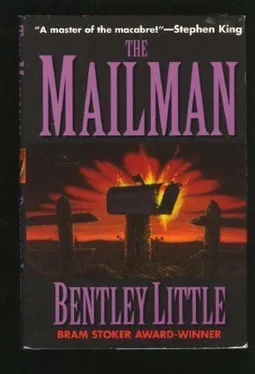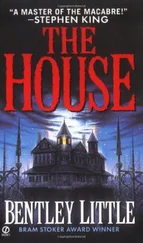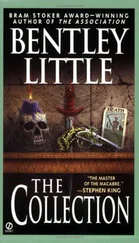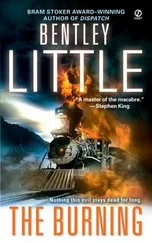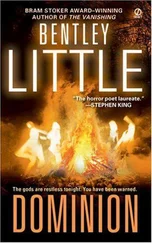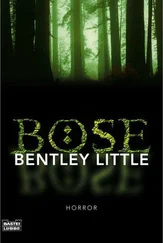"Let's leave, he said. "Let's get the hell out of this town." He looked at her.
"Let's go."
"Permanently or for a vacation?"
"Either."
"I don't know," she said slowly. "It doesn't seem right to just abandon everyone here."
"Abandon who?"
"Everyone. Our friends."
"The ones that are dead, the ones that are crazy, or the ones who've disappeared?"
She turned on him. "What's the matter with you?"
"Nothing's the matter with me. I just want to get out of here so we can get our lives back together while we still have lives."
"And who's going to stop him?"
"Who's going to stop him if we are here?" Doug ran a hand through his wet hair. "In case you haven't noticed, we haven't exactly sent him packing. Hell, we're batting 0 for 0 here. We haven't done a damn thing. Maybe if we leave things'llcalm down."
"And who'll be here to fight him?"
They stared at each other through the thin wall of rain between them. Doug glanced down the hill toward the post office and saw that the flag was flying mockingly at half-mast.
"We can't leave," Tritia said gently. "We have a responsibility here."
"I'm tired of responsibility."
The rain died, cut abruptly off as though a spigot in the sky had been turned, but wetness continued to run down Doug's face, and he discovered that he was crying. Tritia reached out to him, tentatively, touching his cheek, his forehead, his chin. She moved forward and put her arms around his back, drawing him close, holding him, and they stood like that for a Longlong time.
For dinner they had chicken tortilla crepes. The meal was one they all enjoyed, and Tritia had spent much of the afternoon preparing it, but none of them seemed to have much of an appetite and they picked silently at their food, lost in separate parallel thoughts.
The electricity went out again in the middle of the meal, and Tritia picked up the matches and lit the candles she had placed on the table. The power had been going on and off so often lately that she now kept candles and flashlights in each room of the house for backup sources of light. It was getting to be almost second nature. If this ordeal was teaching them anything, it was teaching them to be self-sufficient, teaching them that they did not really need all the amenities they'd always thought they'd needed in order to survive. She wondered how some of the other, older people in town were getting along. Her family, at least, had had a head start -- she had always made food from scratch and over the years had implemented many of the independent natural living suggestions she'd learned from _Mother Earth News_ -- but adjusting might be a little more difficult for some of the other residents of Willis.
The reason for these constant outages was obvious: the mailman wanted to break down their resistance, to make sure they knew that nothing could be relied upon, nothing was safe. The security blanket of civilization was one that he could rip off at will, exposing their helpless nakedness, and doing so was something he clearly enjoyed. Exactly how he accomplished the blackouts, how he brought about the cessation of water and gas and phone service, was still not known. She and Doug had talked to people at the offices of each of the respective utilities until they were blue in the face, but the answers they received were vague and inconclusive, having something to do with fines and penalties, work orders and correspondence.
Paperwork that had gotten fouled up through the mail.
According to a representative for the town's department of water and power, it could not provide services because _its_ water and electricity had been cut off at the source -- the Salt River Project in Phoenix. The project had said, alternately, that the department had not paid its bills and that its quota of services had already been provided. Cited as proof were invoices received through the mail.
But the representative assured Doug and Tritia that the problems would soon be solved, and water and electricity restored.
The man at the phone company, the same manager Doug had talked to before, was even less specific and promised nothing.
It was ironic that the people who were probably having the least difficulty adapting to these circumstances were the ones living on the outskirts of the town, those who normally lived in the most primitive conditions. Now, with their wells and septic tanks and butane generators, their lives were going on as normal, while the rest of them ate cold food and took cold showers and lit candles for light.
"I hope this doesn't last all night," Tritia said.
Doug took a bite of his tortilla crepe. "It probably will."
Billy dropped his fork, and it fell loudly onto his plate. He had hardly eaten anything, had merely cut up and smeared and played with his food.
Tritia fixed him with a no-nonsense stare. "Finish eating your dinner,"
she said.
Billy groaned. "I don't --"
A rock crashed through one of the front windows, glass shattering explosively, muffled not at all by the closed curtains. There was the sound of another rock hitting hard against the outside wall.
"Fucker!" someone yelled angrily. The voice was that of an adult male, not a child, not a teenager.
Doug quickly pushed back his chair, knocking it over as he scrambled around the table toward the front door.
"Don't!" Tritia yelled. Her face was white with fear.
Billy, too, looked scared, and Doug could feel his own heart pounding within his chest, but he rushed to the door anyway.
Another rock hit.
"Fucker!"
And then there was the sound of flying gravel, a pickup peeling out and speeding away.
Doug pulled open the door and ran onto the porch in time to see the taillights of a truck disappearing between the trees. There was still a cloud of dust in the drive. He looked down. At his feet on the porch were several rocks approximately the size of softballs. Although only one had hit the window, two of the others had hit the wall and had been thrown with enough strength to make small splintered indentations in the wooden front of the A-frame. How the hell had someone been able to drive close enough to the house to throw rocks this size and not be heard?
From down the road in the silent forest, he heard the sound of triumphant whooping and hollering, growing fainter as the .truck sped farther away.
"What was it?" Tritia stood in the doorway, trembling, holding Billy's shoulders.
"Idont know."
"Why?"
"Why do the Nelsons think we killed their dog? Why did Todd think I was persecuting him?" Doug looked at his son. "You don't know who did this, do you?"
Billy shook his head, still frightened.
"I didn't think so. Come on. Let's go inside." He herded Tritia and Billy through the door, then closed and locked it behind him. Tomorrow, he'd have to find someone to replace the window. He glanced around the front of the living room. In the candlelight broken shards and bits of glass glittered on the chair and part of the couch. They would have to rearrange the furniture in case something like this happened again. He didn't want Tritia or Billy hit by a rock or cut by a stray piece of glass.
His muscles were still tight, knotted. Although he wanted to know who had thrown the rocks, who had been in the truck, he found himself strangelyunangry with the men involved. He was beginning to see the people of Willis as either victims or puppets, manipulated by the controlling will of the mailman. It was the mailman he blamed for everything, from the deaths of dogs and people to racial attacks to utility failures, and that worried him a little. His attitude seemed too close to that of classic paranoia for him to feel entirely comfortable with it. But, farfetched as it sounded, he knew it was the truth. He was not ascribing an omnipotence to the mailman he did not possess; he was merely recognizing an existing situation. He would not be at all surprised to learn that the mailman had orchestrated everything to occur in such a manner that it would engender within him exactly the sort of doubts he was harboring now. He shook his head. He really was getting paranoid.
Читать дальше
